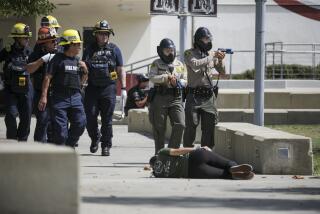Waiting Period for Long Guns Gains
- Share via
SACRAMENTO — Legislation that would abolish California’s traditional cash-and-carry method of acquiring sport rifles and shotguns by imposing a 15-day waiting period advanced in the Senate on Tuesday.
The Assembly-passed bill is widely considered the most far-reaching gun-control proposal in a legislative session uncharacteristically swept by efforts to fasten more restrictions on gun ownership.
The bill cleared the Senate Judiciary Committee with the support of law enforcement organizations over the stiff opposition of the National Rifle Assn. and other gun owner groups.
For almost four decades, handgun sales in California have been regulated by the state. Currently, the 15-day waiting period between purchase and possession applies only to handguns.
The proposal by Assemblyman Lloyd Connelly (D-Sacramento) to extend the waiting period to hunting rifles and shotguns got an important boost last winter when Republican Gov. George Deukmejian embraced the idea.
Deukmejian is a longtime opponent of most new gun controls, but he eased his stance immediately after the killing of five children by deranged rifleman Patrick Purdy in a Stockton schoolyard Jan. 17.
The committee also approved separate legislation that would require prospective handgun purchasers to complete a safety course as a condition to taking possession of the weapon or to pass an equivalency test.
Widening Ownership
Assemblyman Rusty Areias (D-Los Banos), a hunter and author of the safety course bill, told the committee that his proposal represents “common sense” in this era of proliferating handgun ownership.
Both bills were sent to the Appropriations Committee for further action, the final step on the way to the Senate floor, where prospects for passage appeared good. The Connelly bill was approved on a 7-4 vote, one more than it needed in the 11-member Judiciary Committee, while the Areias measure won 6-4 passage.
The 15-day period from the time a handgun buyer makes a purchase until he takes possession gives the state Justice Department time to check to determine whether the buyer has a criminal background or a history of mental illness.
For shotguns and rifles, however, there is no similar restriction. A customer simply may select a so-called long gun, pay for the purchase and walk out the door without government intervention.
Connelly told the committee that about 2,000 people a year are refused possession of handguns because of the background checks and forecast that about 10,000 long gun transactions annually would be terminated by his bill.
He said that under the bill some individuals who shouldn’t legally possess guns “will get weapons illegally from other sources, maybe even the majority, but we will save some lives.”
Gun owner advocates contended, however, that a 15-day wait for handguns has failed. As proof, they noted that far more crimes are committed with pistols and revolvers than long guns.
“Law enforcement is going to spend inordinate time on background checks of law-abiding citizens” when officers would be better used to combat criminals, argued Brian Judy, lobbyist for the NRA.
Sen. Ed Davis (R-Valencia), former police chief of Los Angeles and an outspoken opponent of gun registration, said the bill constitutes registration of long guns and would make it easy for law enforcement officers to identify owners of firearms.
“I don’t want them to know where my guns are,” said Davis, a gun collector and hunter. “Some (registration) clerk could set me up like a pigeon. I don’t want my guns in someone’s damned file.”
In addition, the bill would ban for five years long gun purchases by people held against their will for 72-hour mental evaluations and tighten restrictions on sales of guns at swap meets.
The Areias safety course bill would apply to most handgun purchasers, with certain exceptions such as police officers, people licensed to hunt and former military personnel. Under the jurisdiction of the Department of Fish and Game, the maximum four-hour course would cost $15 and lead to a $20 certification stamp.
The NRA, which operates voluntary firearm safety courses, opposed making such programs mandatory. “It adds one more step and additional costs between an individual making a choice and purchasing a firearm,” Judy said.
More to Read
Get the L.A. Times Politics newsletter
Deeply reported insights into legislation, politics and policy from Sacramento, Washington and beyond. In your inbox twice per week.
You may occasionally receive promotional content from the Los Angeles Times.










